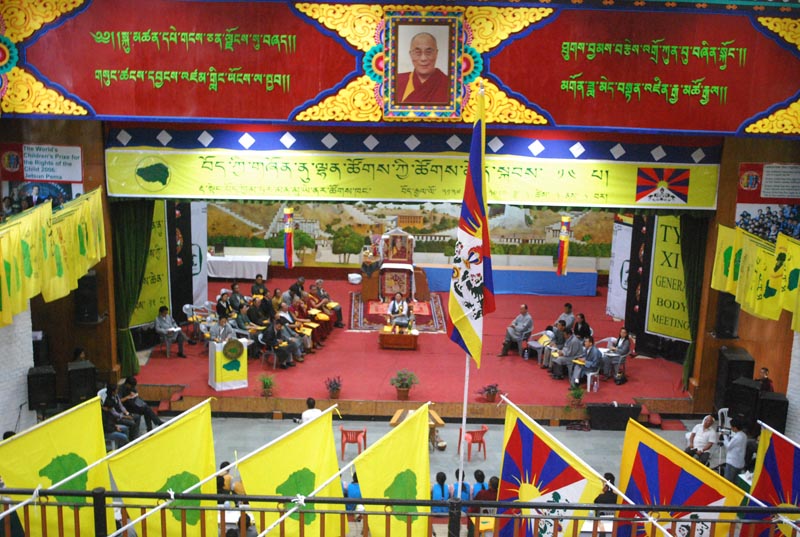 Dharamshala: The 14th General Body Meeting of the Tibetan Youth Congress (TYC) began yesterday in Dharamshala, with a crucial and forthright discussion of the future of its vice president, Dhodhup Dorjee, who was expelled earlier this year for misconduct. After five hours of discussion, the majority of the attending members voted in favour of a demand for Dorjee's resignation.
Dharamshala: The 14th General Body Meeting of the Tibetan Youth Congress (TYC) began yesterday in Dharamshala, with a crucial and forthright discussion of the future of its vice president, Dhodhup Dorjee, who was expelled earlier this year for misconduct. After five hours of discussion, the majority of the attending members voted in favour of a demand for Dorjee's resignation.
Various reports published by the Tibetan media-in-exile predicted that the meeting, beginning yesterday, August 2, and set to last for a week, would be overshadowed by the controversy. His role in preventing a planned hunger strike - a popular method of peaceful protest employed by the Youth Congress, which was to take place in New York last February - resulted in his contentious discharge.
Dorjee came under fire after writing to the US embassy requesting they refuse to issue visas to those intending to travel to America for the strike, claiming that representatives had not yet been selected and therefore any visa request would be fraudulent. In addition to the subsequent invalidation of the visas of those members planning to attend, Dorjee continued to write to TYC members in New York and Jersey on the matter.
On 11th February the Vice President's expulsion was announced, with the support of seven out of nine executive members. There was no doubt that the week's event would bear witness to heated debates over the incident, particularly in light of Dorjee's refusal to accept the decision. "The matter will be discussed, and whatever needs to be cleared will be done in the meeting", the President of the Youth Congress, Tsewang Rinzin, announced prior to the assembly.
Despite this elephant in the room, there was much to celebrate as things got off to a start yesterday morning. 117 members from 47 regional chapters of the TYC, including members of parliament and representatives of non-governmental Tibetan organizations, gathered for the opening of the meeting. It began with all attendees standing to sing the Tibetan National Anthem and the official song of the Tibetan Youth Congress. A minute's silence was later observed, in mourning for those Tibetan people who have lost their lives during the Chinese occupation.
Tsewang Rinzin introduced the conference, which began with the presentation of four awards.Firstly, the Most Active Regional Chapter Award went to Bylakuppe, southern India, followed by the Tibetan Freedom Award which was dedicated to all those who took part in the 2008 demonstrations for a free Tibet and the courage they displayed. The Heroism award went to those who lost their lives to the Chinese military during the aforementioned demonstrations and finally, to all those who gave their time and donations in order to aid those affected by the Kyigudho Earthquake in April, the Social Service Award was bestowed.
The special guest at yesterday's meeting was the Deputy Speaker of the Tibetan Parliament, Mrs. Dolma Gyalri, who launched a new book published by Lobsang Jimpa, former secretary to His Holiness the Dalai Lama. The book, which has been published by the TYC, is a response to the use of the Tibetan name ‘Yedor', under which the Chinese government circulate critical articles about Tibet and other pro-Chinese Communist Party propaganda.
Gyalri later addressed the audience, stressing the need to struggle for either Independence (which the TYC advocates) or the 'middle way approach'. She reiterated that for the Tibetan people, Tibet is not just the so-called Tibetan Autonomous Region (TAR) stated by the Chinese Government, which excludes half of Kham and all of Amdo, but rather the whole of the three traditional provinces that history has witnessed as part of Tibet.
Despite the importance of these events, the rest of the day was set aside to focus on the Dorjee debate alone.
As the old Tibetan saying goes, "if there is no unity in the home, there can be no success outside of it".


![Tibet has a rich history as a sovereign nation until the 1950s when it was invaded by China. [Photo: File]](/images/stories/Pics-2024/March/Tibet-Nation-1940s.jpg#joomlaImage://local-images/stories/Pics-2024/March/Tibet-Nation-1940s.jpg?width=1489&height=878)















